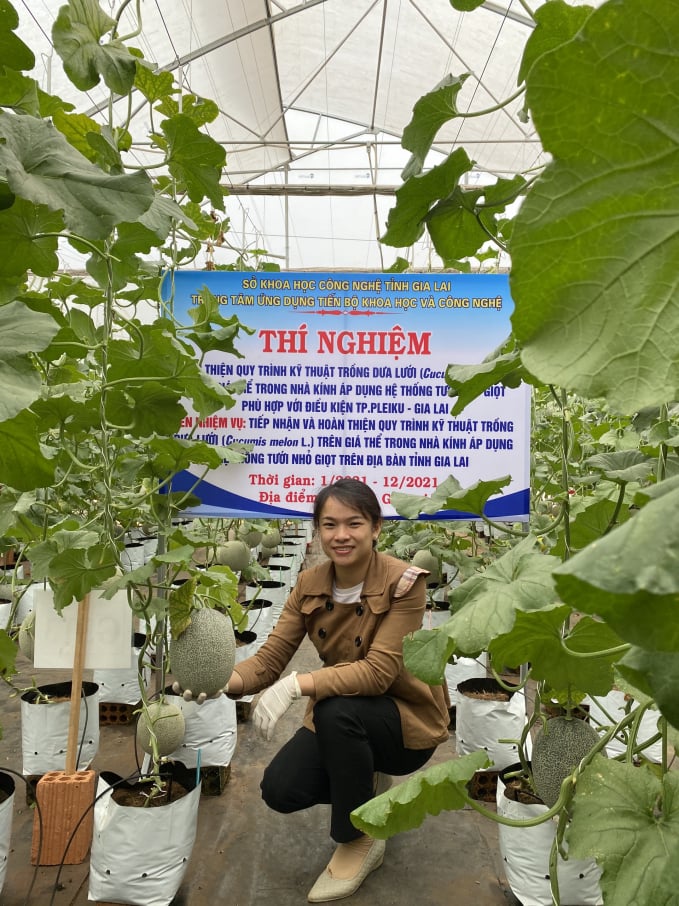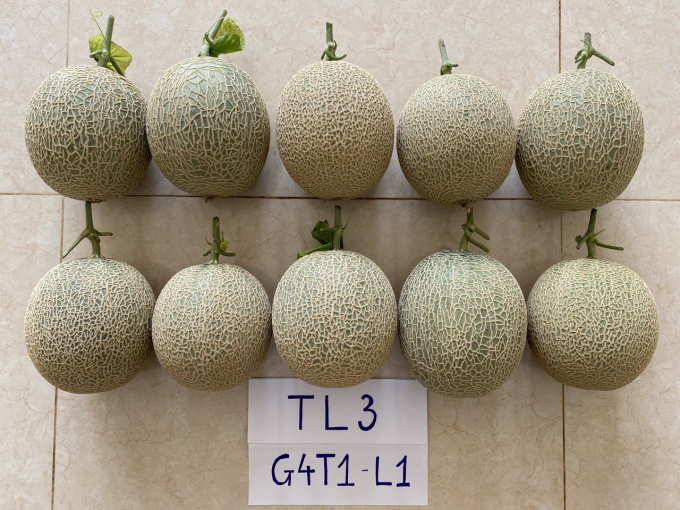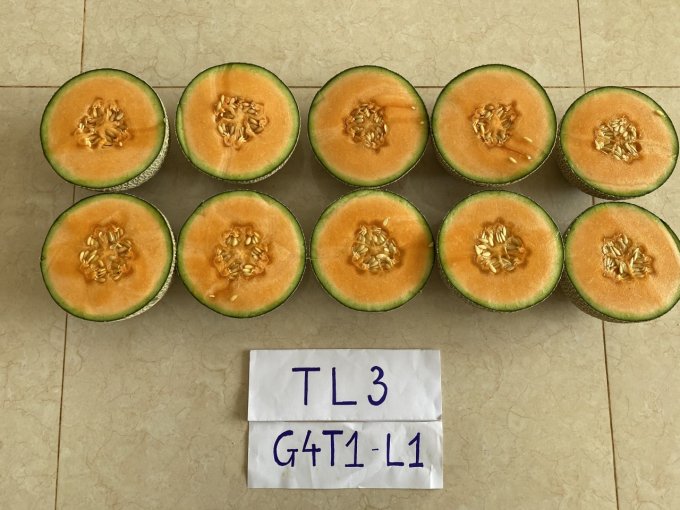May 30, 2025 | 22:42 GMT +7
May 30, 2025 | 22:42 GMT +7
Hotline: 0913.378.918
May 30, 2025 | 22:42 GMT +7
Hotline: 0913.378.918

Project manager, M.Sc. Tran Thi Hoang Nguyen in the experimental garden. Photo: Dang Lam.
The technical process of growing melons on the substrate, applying the drip irrigation system has been researched and completed by the Agricultural Science Institute for Southern Coastal Central in Binh Dinh and has been recognized at the basic level.
In early 2021, this process was transferred to the Center for Science and Technology Application (under the Science and Technology Department of Gia Lai province), with M.Sc. Tran Thi Hoang Nguyen as the project manager, and deployed at the Experimental Production Farm under Central.
According to Ms. Nguyen, the process of growing melons on substrate, applying drip irrigation system is very simple. Firstly, it is required to disinfect the greenhouse to prevent harmful diseases such as insects, fungi and bacteria… Next is to sow the seeds in the tray.
After 10-15 days (depending on the variety), the seedlings will be transplanted into a two-layer PE potting bag containing processed growing media (coconut fiber). After 15 days since the transplantation of the seedlings into the potting bag, more steps shall be proceeded in turn: wrapping the wires, pressing the axillary buds, pollinating with bees, positioning the fruit and leaving only one fruit per string, pruning branches and unnecessary leaves, pressing the tops…
Cantaloupe grown in greenhouses will be fed nutrients through a drip irrigation system 7-8 times per day, 4-5 minutes each time by an automatic irrigation system. All fertilizers used are soluble fertilizers, going along the automatic drip irrigation system...

Cantaloupe products after harvest in the experimental garden. Documentary: HN.
After the trial period, three out of five varieties are ready for harvest: Chu Phan, HL 05 and TL 3. As the person directly implementing the project, M.Sc. Tran Thi Hoang Nguyen said: Growing cantaloupe on substrate, applying drip irrigation system has many advantages compared to conventional planting.
First of all, the process is simple, easy to take care of. From planting into the potting bag to harvesting takes little time, only 60-75 days depending on the variety. Cantaloupe grown in a greenhouse is guaranteed to be a clean product by using fertilizers reasonably and using zero pesticides…
“Through implementing and monitoring the project, it was found that the cantaloupe varieties HL 05 and TL 3 are the two most superior among the five varieties under development, which will most likely be transferred to farmers in the province after finishing the project", shared Ms. Hoang Nguyen.

TL 3 cantaloupe variety is tasty and has high sweetness. Documentary: HN.
“This process is highly appreciated and will be replicated and transferred to farmers in Gia Lai province. The center will directly guide the people on technical and technological processes from the beginning to the collection and preservation time”, said M.Sc. Tran Thi Hoang Nguyen.
Also according to Ms. Hoang Nguyen, currently, the selling price at the Center is fairly high: For TL 3 varieties, the wholesale price at the Center is VND 18,000/kg, the retail price is VND 28,000/kg. As for the HL 05 variety, the price is even higher: the wholesale price is VND 28,000/kg, the retail price is VND 38,000/kg…
/2025/05/29/5625-12-214801_567.jpg)
(VAN) Provincial mergers in the Mekong Delta promise to streamline administration, expand inter-provincial raw material areas, and foster close linkages in agricultural value chains, benefiting both businesses and cooperatives.

(VAN) Merging Mekong Delta provinces contributes to the expansion of agricultural raw material areas, addressing previous constraints caused by provincial boundaries. Additionally, this expansion will reduce costs and strengthen linkages between businesses, cooperatives, and farmers.
/2025/05/29/1043-2-153730_145.jpg)
(VAN) The Government's policy to merge provincial-level administrative units opens up major opportunities for the Mekong Delta region to reshape its agricultural development strategy toward large-scale production, effective regional linkages, and sustainability.

(VAN) The mutual export of agrifood products between the European Union (EU) and the United Kingdom (UK) must occur again without certification, border controls or other red tape. This was agreed at the UK-EU summit.
/2025/05/22/5121-2-173645_677.jpg)
(VAN) NBSAP Tracker identifies strengths and areas for improvement in the National Biodiversity Strategy, based on each region’s priorities and capacities.

(VAN) The draft amendment to the Circular on rice export trading stipulates a periodic reporting regime for rice exporting enterprises.

(VAN) Dong Thap farmers attained an average profit margin of 64% during the summer-autumn 2024 crop (first season), while An Giang and Kien Giang farmers followed with 56% and 54%, respectively.